

Lou McGill
OER_Typology_paper.pdf (application/pdf Object) OER3 Programme Meeting – Part I « Manufacturing pasts. Posted on April 2, 2012 by taniarowlett The recent JISC OER3 programme meeting brought together people from four different project strands (HEA/OER Themes, Rapid innovation, and Content).
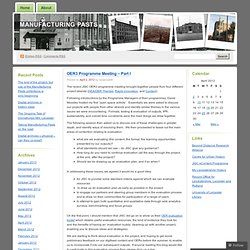
Following introductions by the Programme Managers of their programmes, David Mossley hosted my first ‘open space activity’. Essentially we were asked to discuss our projects with people from other strands and identify similar themes in the various issues we were encountering. Formats, testing & evaluation of outputs, IPR, sustainability, and overall time constraints were the main things we drew together. The following session then asked us to discuss one of these challenges in greater depth, and identify ways of resolving them. What are we evaluating (the content, the format, the learning opportunities presented by our outputs)?
In addressing these issues, we agreed it would be a good idea: A further blog on the afternoons events will follow shortly: OER3 Programme Meeting – Part II. Mixing oil and water? The publisher-OER interface « mossposs. I am currently involved in PublishOER.
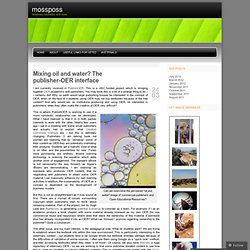
This is a JISC funded project which is bringing together OER academics with publishers. You may think this is a bit of a strange thing to do – I certainly did! Why on earth would large publishing houses be interested in the concept of OER, when on the face of it students using OER may not buy textbooks because of the free content? European Journal of Open, Distance and E-Learning. F.H.T. de Langen [Frank.deLangen@ou.nl], OUNL/NeLL, OERNED, M.E.
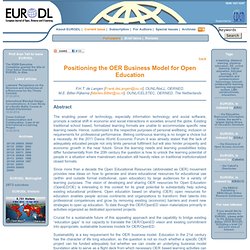
Bitter-Rijkema [Marlies.Bitter@ou.nl], OUNL/CELSTEC, OERNED, The Netherlands The enabling power of technology, especially information technology and social software, prompts a radical shift in economic and social interactions in societies around the globe. Existing traditional school based, formalized learning formats are unable to accommodate specific new learning needs.
Hence, customized to the respective purposes of personal wellbeing, inclusion or requirements for professional performance, lifelong continuous learning is no longer a choice but a necessity. Open Education Week. Open education - case studies. OER and JISC CETIS. The Economics of Open « Paul Stacey. Searching for Sustainable OER « alston road group. OER or open educational resources is one of the good news stories of 2011. OER takes many forms, but what binds initiatives like The Khan Academy , MIT OCW (Open Course Ware) and Stanford’s AI course is that they are all freely available to learners and other educators. It’s this “free” characteristic that has caught the attention of the press. Research in Learning Technology. Browse by SCONUL 7 Pillars - LSE Learning Resources Online. Digital Storytelling. What was May Place. Inspired by Luke Waltzer’s screencast using Google’s Street View to experiment with digital storytelling, I decided to take a look at the neighborhood where I grew up in Baldwin, NY.
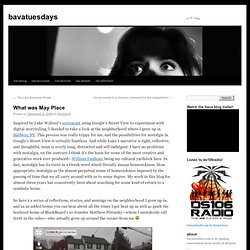
A trip down Memory Lane with Google Street View - Talk About Local. Many thanks to Ben Whitehouse for introducing me to two great examples of people using Google Street View for a virtual trip down Memory Lane.
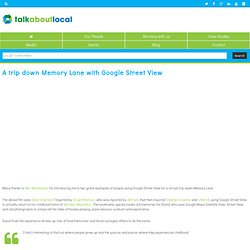
The above film sees Dean Shareski (‘inspired by Doug Peterson, who was inpsired by ZeFrank that then inspired Stephen Downes and others’), using Google Street View to virtually return to his childhood home of Morden, Manitoba. The landmarks quickly invoke old memories for David, who uses Google Maps Satellite View, Street View and old photographs to simply tell his tales of hockey playing, piano lessons, sunburn and exploration. David finds the experience draws up ‘lots of fond memories’ and he encourages others to do the same: ‘I find it interesting to find out where people grew up and the spaces and places where they experienced childhood.’
ZeFrank's A Childhood Walk ZeFrank found these stories just as interesting, so created the project A Childhood Walk to encourage readers to contribute their own. Nicky Getgood. Education.
Technologies. Womens issues. Information. Loumcgill.co.uk. Who do I think I am? It’s funny because I was lying awake the other night thinking about writing a blog post about this and today I came acros Bon Stewart’s post about digitial identity and her PhD and she asks ‘Do you believe in a real, authentic core self?
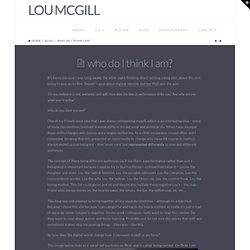
How does the idea of performance strike you? And who are you when you’re online? Who do you think you are?’ One of my friends once said that I was always reinventing myself, which is an interesting idea – some of these reinventions involved massive shifts in my personal and political life. The concept of there being different audiences (as if my life is a performance rather than just a beingness) is important because I used to try to box my life up – compartmentalise it – Louise the daughter and sister, Lou the radical feminist, Lou the sociable extrovert, Lou the Librarian, Lou the conscientious worker, Lou the wife, Lou the lesbian, Lou the Union rep, Lou the control freak, Lou the loving mother. Being and nothingness. Lou McGill decisive moments and meandering paths.
Photographic journal of life in Dumfries and Galloway.
Autism. Save The Words. Photography. Futures. Dumfries and Galloway.